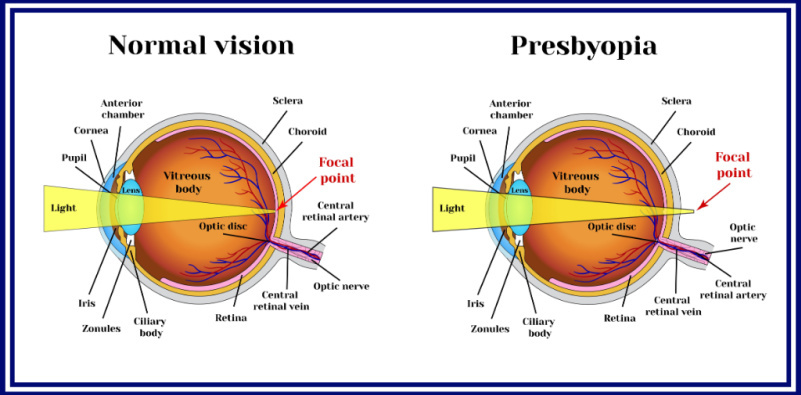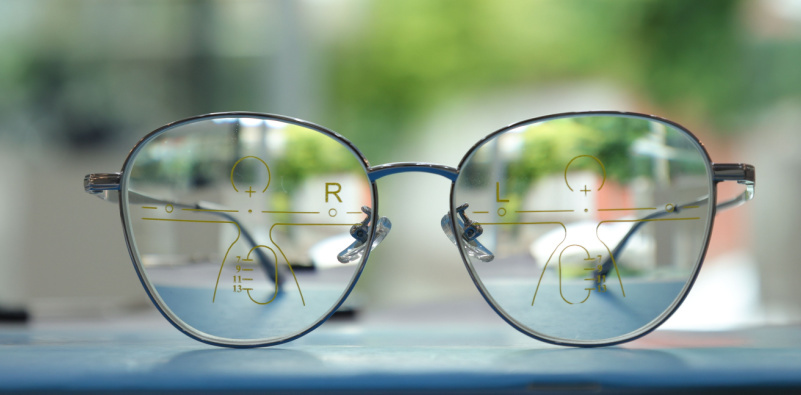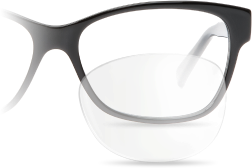Does vision get worse with age?

As you get older, your body, including your eyes, starts to show signs of aging. You might start to notice that you can’t see small details up close as well as you used to, or maybe reading gives you a headache. These are signs of presbyopia, a condition that affects 128 million Americans – the majority of people over the age of 45.
What is presbyopia?
Presbyopia is very normal and the most common of eye problems with age. It affects everyone and is the reason many older people need to wear reading glasses. In technical terms, it is a refractive error that occurs because the lens, the part of the eye that helps you focus, becomes less flexible. This stops it from being able to change shape and focus light correctly on the retina at the back of the eye. The result is that close-up objects start to appear out of focus as you get older.
For most people, presbyopia starts in the early to mid-40s and continues to worsen until around the age of 65. Nobody is quite sure why the lens becomes inflexible as we age, but we know that almost everyone experiences it. So, in answer to the question, ‘Does vision get worse with age?’, the answer is yes, but it’s an easy fix with the right glasses.

Symptoms of presbyopia
Although you will probably first notice the onset of presbyopia when you have to start holding text further away to focus on it, there are other signs of aging eyes associated with the condition. As well as your vision blurring at your normal reading distance, you may also experience eye strain and headaches. In addition, possible symptoms include needing more time to adjust to different light levels and difficulty focusing between changing distances.
If you are having a hard time reading or doing close work, it’s time to see an eye doctor and check your vision. You’ll likely need to wear glasses or change your prescription if you already wear glasses or contact lenses.
It is important to note that despite sharing similar symptoms and both being refractive errors, far-sightedness and presbyopia are two separate conditions.
The solution to presbyopia
For many people, progressive lenses are a good solution to the onset of presbyopia. These multifocal lenses have three zones of vision covering everything from near to far vision, and everything in between. Unlike trifocal and bifocal lenses, there are no lines between the different vision areas, allowing them to blend into one another, so nobody can tell that you are wearing glasses that give away your age! This seamless transition from near to far allows you to easily adjust your vision and see all distances.
The top part of the lens is designed for distance vision tasks such as driving. The middle part of the lens is for intermediate vision, including watching TV. The lower part of the lens is the area you use for close-up tasks like reading.
If you haven’t worn progressive glasses before, it can take a bit of adjustment. You need to train your eyes to look through the right part of the lens to focus on the distance required. Some people get used to their new lenses in a week, while others say it can take longer.

Advantages of progressive lenses
The main advantage of wearing glasses with progressive lenses is that you don’t need to take them on and take them off to focus on different distances. If you only need glasses for close-up work, you could have a pair of reading glasses, but forgetting or losing them can be easy if you’re out and about.
If you have a refractive error such as near-sightedness and already wear glasses to correct it, you may find yourself having to wear two different sets of eyeglasses if you are told you then have presbyopia. Swapping between the two whenever you need to focus on a different distance can be tedious, and keeping track of two pairs of glasses is even worse than one! Having one pair of glasses you wear all the time and use for all distances is the perfect solution.
You can also opt to buy different types of progressives, such as light-adaptive ones, which naturally darken in sunlight as a reaction to UV, eliminating the need to have a separate pair of sunglasses.

Buying progressive lenses online
At Replacement Lens Express, we offer a wide range of progressive lens types and materials to browse at your leisure. We cater to all budgets and requirements, from affordable lenses to premium options. Some lenses are thinner than others, materials such as polycarbonate offer impact resistance, and all of them can be customized to you and your vision requirements. We also offer the option of sunglasses, polarised lenses, and photochromic progressives.
When choosing new progressive lenses online, remember that the lens quality can make a big difference to your field of vision. A high-quality lens giving a wider field of vision will take less time to adapt to.
Our search filtering function makes selecting the best lenses to suit your needs easy. Once you’ve chosen your lenses, you will be guided through the simple process of entering your prescription details and placing your order. If you want an entirely new pair of progressive glasses, we also sell a wide range of frames to suit all styles and budgets.
Start shopping today to get your progressive lenses from top lens suppliers and our very own high-quality lenses and get the better of aging by giving yourself the best vision possible.






















